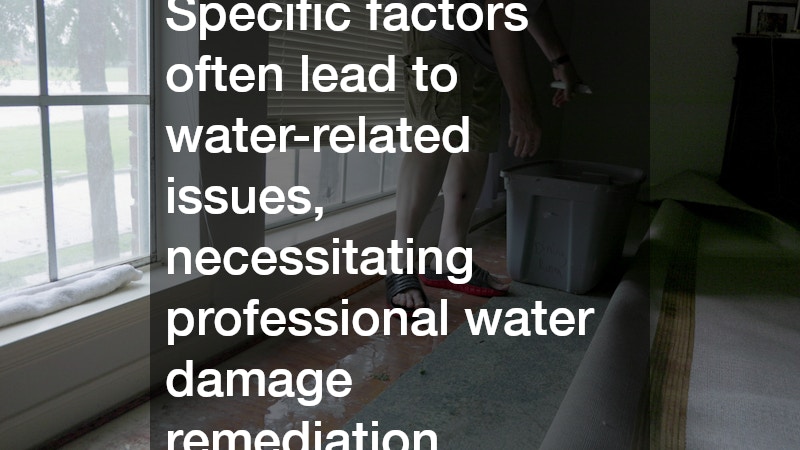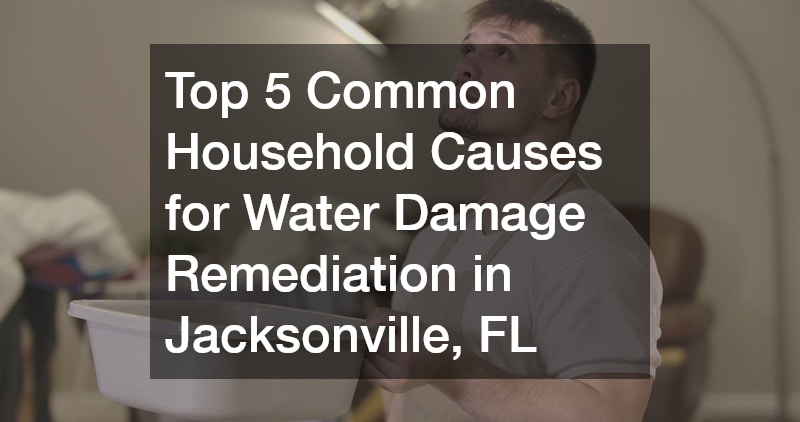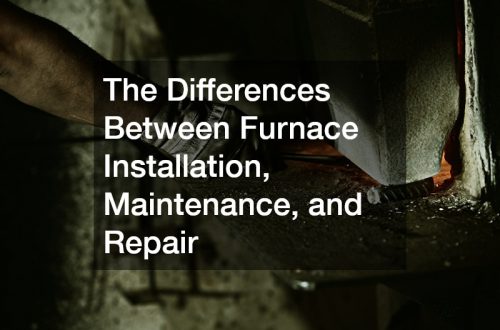
Understanding the primary contributors to water damage in homes can help you prevent costly repairs and preserve the integrity of your property. In Jacksonville, Florida, specific factors often lead to water-related issues, necessitating professional water damage remediation. This article explores the top five causes of household water damage in the area, providing insights into prevention and remediation.
1. Plumbing Failures and Leaks
Plumbing systems within a house are often intricate, with numerous pipes and fixtures that are prone to wear and failure over time. Burst pipes, one of the most common issues, can result from various causes such as freezing temperatures, corrosion, and excessive water pressure.
In Florida, where temperatures rarely drop significantly, corrosion and poorly maintained systems are more common culprits.
Faulty fixtures, including toilets, sinks, and showers, can lead to constant or intermittent leaks that, over time, cause significant water damage. Proactive maintenance and timely repairs are crucial in addressing these issues before they escalate into more severe problems requiring extensive remediation efforts.
Deteriorating plumbing infrastructure in older homes can also lead to unexpected failures. Regular inspections by qualified professionals can identify potential weaknesses in the plumbing systems, allowing homeowners to address issues before they lead to catastrophic water damage.
2. Roof Leaks During Heavy Rains
Roof leaks during heavy rains are a common issue in Jacksonville, where the weather can significantly impact the structural integrity of residential properties. Aged roofs, poor installation, and lack of regular maintenance are key contributors to water intrusion, especially during heavy downpours. When roofs are not equipped to handle the deluge of water, it can lead to leaks that compromise the home’s interior.
Florida’s weather patterns often include intense storms that test the durability of a home’s roofing material. Even the smallest crack or missing shingle can become a significant entry point for water, causing widespread damage inside the home. Homeowners should conduct regular inspections and perform maintenance tasks such as sealing cracks and replacing missing shingles to safeguard their homes.
Additionally, the use of high-quality roofing materials resistant to harsh weather conditions can provide an extra layer of protection. Investing in durable materials and regular professional inspections can help prevent leaks and the resultant water damage in the long run.
3. Blocked Gutters
Blocked gutters are a frequently overlooked cause of water damage in residential settings. When gutters are clogged with leaves, debris, and dirt, they prevent proper water drainage from the roof. Water then begins to pool and overflow, finding its way into the home’s foundation, walls, and interior spaces, thus causing extensive damage over time.
The importance of regular cleaning cannot be emphasized enough. Homeowners should schedule routine maintenance to ensure gutters are free of blockages. This practice helps maintain efficient water flow, directing rainwater away from the home and preventing it from pooling on rooftops or around foundations.
Neglecting gutter maintenance can lead to severe structural issues, including foundation compromises and interior leaks. When water is not properly channeled away from the property, it can erode the foundation, leading to costly repairs. An investment in regular cleaning services will likely save homeowners from far more expensive remediation efforts down the line.
4. Poor Drainage
Poor drainage is a significant factor contributing to water damage in homes, especially in geographical locations such as Jacksonville, where heavy rainfall is common. Insufficient drainage around the home leads to water pooling, which can penetrate foundations, basements, and crawl spaces. Such exposure can severely weaken structural components, leading to extensive and costly repairs down the line.
Proper grading and slope management are critical to effective water diversion away from the home. Ensuring that the land slopes away from the property allows for natural water runoff, minimizing the risk of water pooling near foundations. Homeowners are encouraged to conduct an assessment of property slopes to identify areas needing improvement to enhance water flow.
Implementing drainage solutions, such as French drains and sump pumps, offers additional protection to homeowners. These systems ensure that excess water is efficiently redirected, preventing accumulation and subsequent infiltration into vital areas. By applying comprehensive drainage strategies, homeowners in Jacksonville can safeguard against the detrimental effects of poor drainage.
5. Lack of Appliance Maintenance
Household appliances are often unexpected culprits of water damage, primarily when maintenance is overlooked. Washing machines, dishwashers, and water heaters are frequent sources of disruption due to malfunctioning components or aged parts. Specifically, hoses, seals, and drainage components can deteriorate over time, leading to leaks or bursts.
Regular maintenance checks help mitigate risks associated with appliance failures. Scheduled inspections of hoses, seals, and other crucial components alert owners to potential issues before they lead to significant water damage. Proactive assessment and subsequent part replacements are essential practices in reducing risks associated with appliance malfunctions.
Recognizing early signs of issues can prevent major incidents. Indicators such as unusual noises, inefficient operation, or visible wear call for immediate attention. Addressing appliance concerns prevents larger issues from developing, protecting homes from the extensive damage that unnoticed water leaks can create.
Conclusion
In conclusion, water damage in Jacksonville homes is often due to predictable and preventable conditions. By recognizing the signs and implementing proactive measures, homeowners can protect their properties from these common water intrusion issues. From addressing blocked gutters to ensuring appliance functionality, vigilance and maintenance are key to mitigating the risk of water damage.






